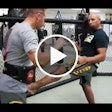I remember a "training officer" I had once, back in my "cub" days, who decided that the best way to break in a new guy was to act all tough and hard, and to intimidate me with his experience and his disdain for me and for what I thought I knew.
He was a little more subtle than your average bully. He gave the appearance of just riding along, chatting. Then, when I would say something that I thought was brilliant, or at least meaningful, he would go quiet, scowl, and make a disparaging remark.
That was not helpful.
Another time, after I'd been a copper for several years, I attended a class put on by another, larger, agency. The first day, the lead instructor went to the front of the room to welcome us. The central theme of his "pep talk" was that he didn't really care if we passed or not, he would get paid anyway, so our success or failure was entirely up to us.
I got to know both of these individuals over the years, and they both turned out to be decent guys. However, neither of them had a clue regarding what it took (takes) to train someone, or how to bring them along if they are struggling.
As trainers, we're dealing with two fundamentally different types of adult learners. On the one hand, if you're training a recruit – say as an FTO, or maybe an academy instructor – there is a need to impart information in a way that is very similar to "school." Recruits are in a twilight-zone between the motivations of pedagogical, or child-like, learners and andragogical, or adult, learners.
Kids go to school because it's their "job." They know no other motivation. Adults, on the other hand, go to school – or training – because they need the information (either they have decided they need it, or someone else has decided for them).
Recruit Learners
Recruits and new officers are in that no man's land in between. They know that it is their job to learn, but they also know that they need the information. As we train them in the academy and in our FTO programs, we need to be aware of both sets of needs, and feed both motivations.
It is the job of the academy instructor to teach information, and to impart wisdom, in an atmosphere that will make it possible for the recruits to assimilate smoothly (relatively speaking) into their eventual departmental employment. A significant part of that duty is to mentor the recruit, while still maintaining a disciplined environment.
Many of the recruits coming into law enforcement today have little, if any, exposure to the type of disciplinary system we have in police work. Once upon a time, many of our incoming recruits had military experience, and were thus used to functioning in a disciplined environment. In short, they were able to take orders, and they understood the reason why they should follow them.
The last 20 years have seen a steady decrease in the number of recruits with military backgrounds. Because of that, academy instructors have struggled to meet this fundamental training need. While there are many unfortunate outcomes stemming from the current Mideast conflict, one positive side effect is that we are beginning to see more recruits with military experience.
Once recruits graduate and move to an actual agency, they typically become immersed in that agency's FTO program. Ideally, this is where they learn to apply the knowledge and skills they absorbed in the academy to actual street-policing situations.
Too often in the past, Field Training Officers have taken an authoritarian position with these new recruits, in effect turning the FTO program into a psychological extension of the academy. This can have a negative impact on the recruit's ability to learn. If the recruit is constantly in fear of his or her FTO, and the negative outcomes implicit with poor performance in the program, the recruit will struggle.
Ideally, the FTO would act more as a mentor to the new recruit, taking on the mantle of facilitator, helping the recruit to learn the ways of the department, so that he or she can succeed. The ultimate goal of the FTO process is to produce fully assimilated, successful officers – NOT to weed out as many recruits as possible.
In-Service Trainees
The in-service officer, on the other hand, is an entirely different matter. Here we're liable to see anything attitudinally – from the earnest, inquisitive professional to the hard-nosed know-it-all who doesn't want to be there. As trainers, we have to deal with both.
The key to dealing with an adult learner is two-fold: First, the material you're teaching must relate to them. Adult learners must perceive an immediate need for the information that you are trying to impart. If they can see that it relates to them and to their needs, they will be much more open to receiving it.
Secondly, adult learners must be treated with respect. That means that we trainers must know who's in our audience, and what their needs are. Next, we need to be prepared to deliver the information in a way that they will perceive as befitting their current station in life. Talking to them in an overly simplistic manner, or over-explaining with three examples where one would do, are sure ways to lose them.
This respect also extends to things like the materials that we hand out (simple, straightforward, and immediately useful), and the manner in which we manage our training environment (plenty of breaks, refreshments, and a comfortable atmosphere).
As trainers, we must remember what it was like to be that recruit, or to be that midnight shift officer forced to sit through a day shift class after working all night. If we can attain and maintain that level of understanding of our students' needs, much of the rest will fall easily into place.
Wear your vest, and Buckle Up!

















